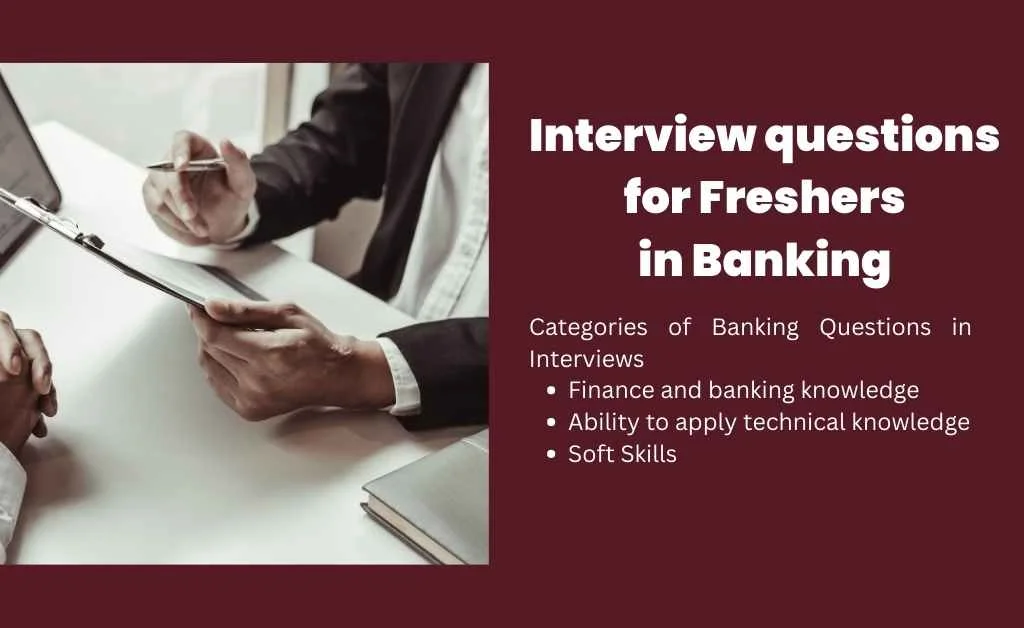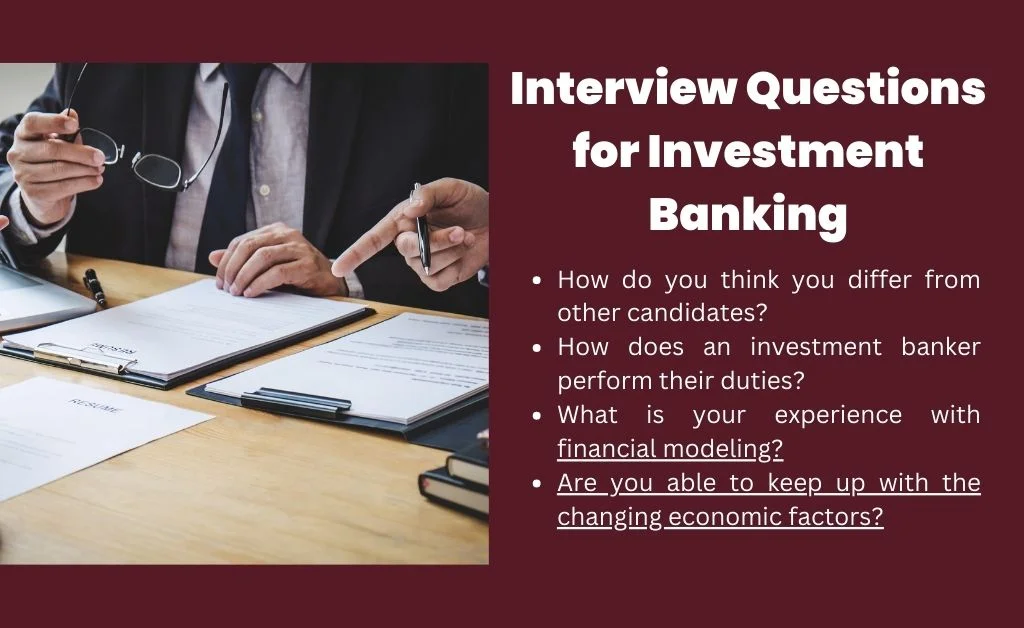Table of Contents
ToggleIntroduction
Understanding what you may be asked in a Banking Interview helps you put your best foot forward. Here are some top banking questions you should anticipate when going into an interview, whether you’re a fresher or a professional.
Q.1 Could you please describe your background in Financial Analysis?
Ans: How to answer- This is a very subjective question.
This question is intended to test your knowledge of accounting principles and procedures as well as your capacity to analyze and explain a company’s financial performance. By mentioning any pertinent expertise in carrying out financial analysis, give instances of how you have applied this knowledge in prior employment.
Q.2 What does risk management in banking mean?
Ans: In most cases, credit analysts and portfolio managers are asked this question during the interview process.
To answer effectively, explain that risk management involves minimizing and mitigating potential losses while maximizing gains. Provide strategies for gauging creditworthiness and monitoring portfolios throughout their lifetimes while emphasizing risk-minimization practices.
Q.3 What is your Experience with Customer Service?
Ans: This question is usually posed during interviews for bank jobs since offering excellent customer service is vital in providing effective solutions for clients.
Be ready to talk about your experiences with customer service, especially those that show your professionalism, skill in working well under pressure, capabilities in problem-solving, attention to detail, and communication abilities. When possible, provide concrete examples of how dealing with customers helped you gain an understanding of their wishes and expectations.
Interview questions based on knowledge of banking
You need to be able to assess your knowledge of banking topics and understand what bankers expect from you. Knowing what types of banking questions might be asked is crucial to presenting yourself as a credible candidate.
When it comes to job interviews related to banking, freshers may find it challenging to demonstrate their knowledge of the subject. Studying core issues like finances, investments, and regulations is highly recommended. Practicing potential questions with roleplay or someone who works in banking also improves your chances of success.
When you have professional experience working in the finance industry, remember that banks are always seeking innovative solutions and ideas. If you have worked on any projects, be prepared to explain how they have contributed to the bank’s goals and operations.
Furthermore, many banks are looking for people who are able to work with technology; therefore, brushing up on your tech skills is also crucial when interviewing.
Also, read: ACCA Salary in India
Interview questions for Freshers in Banking

If you’re a new hire or fresher in the banking industry, you can expect some specific technical and analytical banking questions in your interview about economics or financial markets, such as recent market trends and news stories.
Employers can use these types of banking questions in interviews to evaluate your knowledge of current financial events, as well as whether or not you possess a natural aptitude for understanding complex financial topics and markets.
Knowing what kinds of questions are typically asked during interviews is essential for freshers or those with little experience in banking. This will not only help you prepare better but also boost your confidence during interviews.
Categories of Banking Questions in Interviews
- Finance and banking knowledge
- Ability to apply technical knowledge
- Soft Skills
Some probable technical knowledge banking interview questions include:
- “How would you assess a loan application?”
- “Describe your approach to financial analysis.”
Banking interview questions may require freshers to have an in-depth understanding of financial analysis, lending principles, and other aspects of banking.
For bankers across the Board, soft skills are becoming increasingly important. Interviewers may ask behavioral questions, such as:
- “How do you deal with difficult clients?”
- “Describe a time when you took initiative at work.”
In order to provide examples from the real world, freshers must think through scenarios when answering banking interview questions.
Interview Questions about Banking for Professionals

Preparing for a banking interview can be intimidating, but with practice and the right knowledge, it is possible to feel confident in your response. Researching possible banking questions in interview scenarios is crucial before you step into a banking interview. You should be prepared to answer the following common banking interview questions before you go into the interview. This applies to professionals too.
Professionals transitioning into the banking industry will likely be questioned about their previous experience and how it applies to the role they’re pursuing. Interviewers may inquire about technical proficiencies and expertise in certain financial aspects associated with the job. To present oneself confidently during a job interview, it is essential for one to review their technical knowledge beforehand.
Interview Questions for Investment Banking

Here are some of the most common questions you might encounter during your upcoming Investment Banking Interview:
Q.1 How do you think you differ from other candidates?
Ans: Give an overview of your skills, talents, experiences, and knowledge that make you qualified for this job. Include examples from specific projects or accomplishments that demonstrate your ability to deliver results.
Q.2 How does an investment banker perform their duties?
Ans: Investment bankers are responsible for researching and analyzing financial data, such as economic trends, financial instruments, portfolio management strategies, etc., recommending investments to clients and monitoring their portfolios.
Q.3 What is your experience with financial modeling?
Ans: Companies’ value and future performance are assessed using financial modeling. Your response should include some examples of recent projects where you used financial models and explain how they helped you in your analysis or decision-making process. In addition, provide details on the scope/size of the project(s) that included modeling work, such as background information about the company/industry sector being analyzed and assumptions used in the model construction process.
Q.4 Are you able to keep up with the changing economic factors?
Ans: You should be aware of changing economic trends that may affect your clients’ portfolios. What resources do you use to stay up to date on these trends?
For more such information you can read our other Banking Blog- Banking Placement
Tips for Banking Interviews:
- Carry a copy of your resume as well as any other documents that the bank may have requested.
- Be on time. Punctuality is a highly regarded trait. Make sure you arrive at the place at least 30 minutes before the interview begins.
- Relax and just be yourself
- Adopt a good posture, don’t slouch
- Make eye contact and grin every now and then
- Speak in a clear and audible tone
Questions for Banking Interviews:

- Is there anything you have that makes you an ideal candidate for this position?
- Are you prepared for a role in banking based on your previous work experiences?
- So far, what have been some of your biggest successes in banking?
- What are your strategies for handling complex financial scenarios?
- During past banking projects, what challenges did you face?
- In difficult situations, how did you manage your relationships with customers?
- In a banking environment, how do investment decisions get made?
- Describe how financial regulations affect bank-client relationships.
- How do your leadership qualities contribute to this role?
- In your opinion, has technology improved customer service practices within banks?
Conclusion
To begin, learn about the banking business, become acquainted with terminology, and investigate current developments. You need relevant examples of achievements to share in an interview that demonstrate your financial capability.
Don’t ramble during the interview. Be prepared for follow-up questions from the interviewer and practice responding succinctly and effectively. In addition, make sure that your body language demonstrates that you are enthusiastic about the job and show genuine interest at all times.
Frequently Asked Questions (FAQs)
The CRR is a reserve held by banks with the RBI. It refers to a fraction of bank deposits held in cash. SLR is a mandated reserve that commercial banks must maintain on hand. It represents a share of commercial banks’ net demand and time obligations held as authorized securities.
6.50 percent The policy repo rate will increase by 25 basis points to 6.50 percent at the direction of the Monetary Policy Committee (MPC). They take this action to encourage economic development and ensure that inflation stays within their target range.
It is the interest rate established by a nation’s central bank for loans made to commercial banks (for example, The Reserve Bank of India in India). If banks don’t have enough money, they borrow it from the central bank.
A bank is a financial institution that is authorized by the government to accept deposits and make consumer loans.
Narasimham is referred to as the father of banking reforms in India.



